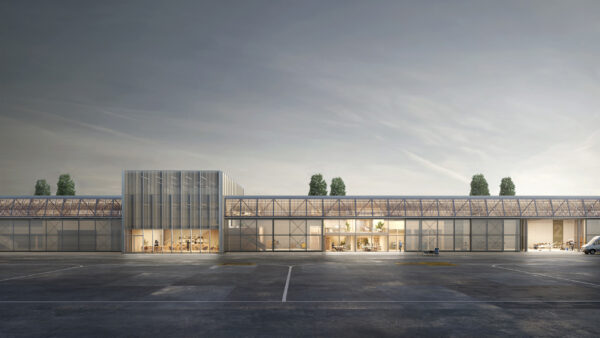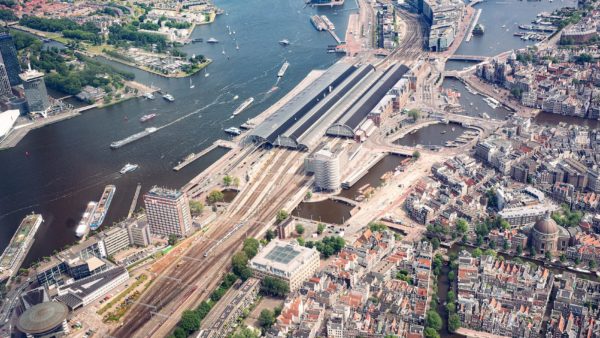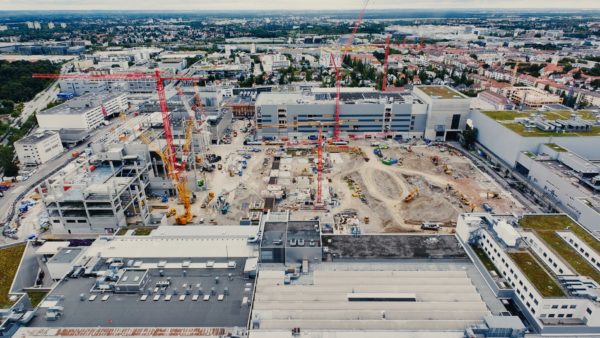26 March 2014
Clean energy developer Assaad Razzouk tells GCR how his company has moved into profit with targeted ventures in Asia, and how everybody could make money being green if the odds weren’t stacked so heavily in favour of fossil fuels. Rod Sweet reports
Between 2010 and 2011 the consolidated revenues of the niche clean energy developer Sindicatum jumped from $8.5m to $40m.
It confirmed the vision of CEO Assaad Razzouk, former investment banker at Nomura International in London, who co-founded the company in 2005.
“I started purely from looking at the numbers,” he says from the firm’s HQ in Singapore. “I co-founded the company not to save the world but because climate change mitigation makes financial sense.”
“Obviously,” he adds in the same breath, “over time you get passionate about the climate change agenda because it dawns on you that it’s an existential issue for the whole planet, but I didn’t start from that vantage point.”
With around three hundred staff, mostly employed in engineering and project execution, Sindicatum develops clean power generating schemes where great quantities of the greenhouse gas methane is going to waste -Â primarily municipal rubbish dumps, coal mines, and food and chemical processing sites.
Its plants generate power, for instance, from Bangkok’s massive waste tip, from an ethanol plant in Sumatra, from coal mines in China, and from sugar mills in India.
Right now nine installations produce a total of 105 MW of electricity, while more plants combining another 129 MW are under construction. Farther down the pipeline are plants totalling another 300 MW.
In the scheme of things, 105 MW now may be small beans. But Razzouk, who before Nomura was international capital markets manager at Price Waterhouse in New York, may well have a chance to be the world’s first “methane magnate”.
“When we founded the company we were focussed on abating greenhouse gases,” he says. “The next step was to work out which greenhouses gases it was most economical and profitable to abate. And the answer to that is methane.”
There’s much less of it about than carbon dioxide but methane’s warming effect is over 20 times more potent than CO2, according to the US Environmental Protection Agency. It’s also easier to capture from existing industrial and waste processes.
“You get the most bang for your buck with methane,” Razzouk says.
Treasure in trash
Take, for instance, the Bangkok rubbish dump. Six thousand tonnes of waste get sent every day to a site outside the city at Kamphaeg Saen.
Sindicatum worked with the owner of the waste concession to engineer the site so that the methane produced in the heaps of trash can be captured by a system of pipes and used to produce energy, which is sold to the grid.
In Sumatra, Indonesia, the company Indo Ethanol makes medicinal grade ethanol from cassava. The wastewater produced in this process is normally left to rot in lagoons, slow-releasing methane into the atmosphere. Sindicatum installed anaerobic reactors to digest the sludge and extract the methane to produce energy.
Agricultural waste provides rich pickings for Sindicatum and for this, India is the motherlode. Sugarcane farming is a means of subsistence for millions there – “not thousands, but millions,” says Razzouk.
They sell the cane to local mills that produce sugar, and the fibrous husk left over is called bagasse. You get about three tonnes of it for every 10 tonnes of crushed sugarcane.
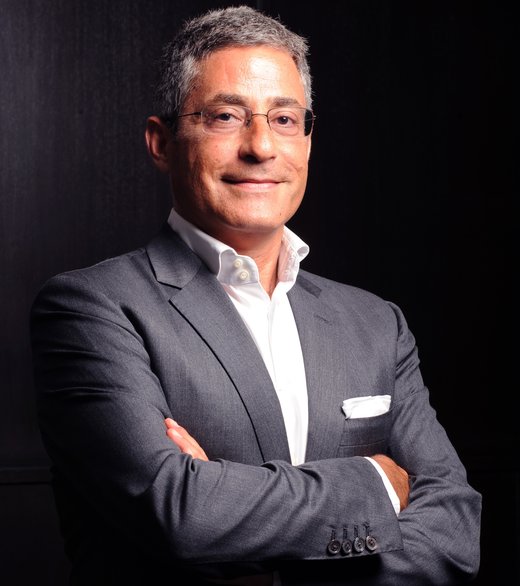
Sindicatum CEO, Assaad Razzouk
Sindicatum agrees with mill owners to build a power plant or to upgrade their existing one. The mill owner hands over the bagasse and Sindicatum uses it to generate heat and electricity, giving the mill a reliable source of power. Any left over gets sold to the grid.
Were it not for this symbiotic relationship, the bagasse would be left to rot and would, like the cassava gloop, seep methane for years.
Razzouk says this arrangement frees the mill owner from the unreliable fossil fuel power infrastructure and reduces demand for dirty energy.
Four of the company’s nine operating power plants are in India.
Mutually-assured destruction
“To make sure everybody’s interests are aligned we own the power plant in a fifty-fifty joint venture,” Razzouk says. “The deals are built on the principal of mutually-assured destruction, so that everybody loses if anybody plays games.”
To adapt to the real-world opportunities in clean energy, Sindicatum’s business model evolved quickly.
At first they were headquartered in London but it became apparent that they needed to be in Asia because that’s where they were getting traction. By 2008, 90% of its portfolio was in China, Indonesia, Thailand, the Philippines and India. So they moved to Singapore in 2009.
“The five countries we’re in between them have half the world’s population,” Razzouk says. “That’s why we’re here – clearly there is an enormous amount of waste.”
Europe is not on Sindicatum’s radar at the moment.
“Our expertise is to take European technology and know-how and deploy it in markets where that know-how makes a big difference,” Razzouk says. “We have the expertise to go into what are perceived as difficult markets and, because we’re so specialised, negotiate deals that work for us and for our partners.”
He adds: “We don’t take technology risks. We’re not in highly advanced areas where you need effectively to bet on new technology. We use technology that’s proven and already in use elsewhere and we just bring it to markets that really need it.”
China off the boil
Once in Asia, the company’s strategy evolved further. At first the big prize was seen as China, where Sindicatum now operates plants in coal mines in Shanxi province for China’s second largest coal mining group.
The approach is the same. Sindicatum captures the methane – in this case freed by the mining process – and generates electricity with it for the mining operation to use. Razzouk says the Shanxi operations generate 27 MW, a figure not included in the 105 MW now generated by municipal waste and agricultural by-products elsewhere.
In the last three years, however, China has gone off the boil for Sindicatum because of the restrictive energy ownership rules there. Sindicatum wants joint ownership, and prefers to deal with private-sector operators.
“We try to avoid having to make friends with governments,” Razzouk says.
Thailand became the company’s next main target, and now India is its number one destination.
So how’s business?
While its revenues have shot up since the company began, Sindicatum has also been investing heavily in plants – between $400m and $500m, Razzouk says.
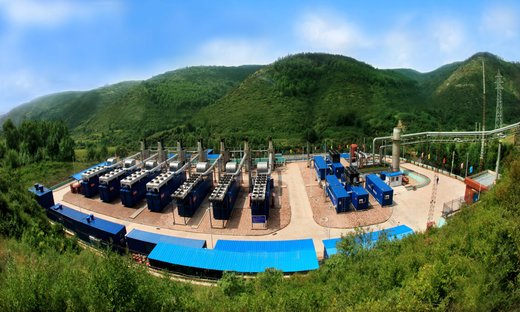
Sindicatum’s 12 MW methane plant at the Duerping coal mine in Shanxi Province, China (Sindicatum)
He is candid about the company’s profitability: “We’re profitable – we kind of wash our face – but the returns for investors are not where they should be given the risks we’re taking.”
Since 2008 the entire clean energy sector has had a tough time competing for investment, Razzouk says, a difficulty compounded by Sindicatum’s choice of markets.
“You can invest in clean energy in the US and there your money might want six percent back, or eight percent. But in China and India and Thailand your money’s going to want a lot more than that back, because of the additional political, commercial and economic risks.
“India, say, has a lower credit rating, more unstable finances, more poor people, more governance problems, and so forth. So a clean energy dollar going into India wants to get paid more than a clean energy dollar going into the US.”
Fortunately for Sindicatum, its investors know what they’ve got themselves into.
“Eighty percent of our investors are long-term institutional investors, pension funds and endowment funds from the United States,” he says.
“They are patient, ultra-smart investors. They know that what we do is a ten-year cycle, and they know that clean energy developers are fighting against enormous entrenched interests, and they are having a tough time squeezing a profitable dollar out of what they do – us included.”
Fossil future?
By “enormous entrenched interests” he means the incumbent fossil-fuel energy economy and here, it’s telling that Sindicatum has so far been denied access to a vast source of world-warming methane.
“Oil and gas is controlled by just a few big companies and they flare and ventilate methane all day long,” he says. “But because they’re generally in denial about it they don’t engage with operators like us when we say, look, you’re ventilating an enormous amount of methane, why don’t you allow us to come in, build a plant to capture it and pipe it away as natural gas? But they don’t engage.”
It’s exactly the world’s fossil fuel “architecture”, he says, that is preventing the rightful emergence of a profitable, global-scale clean energy sector.
“We can be powered today 100% by renewable energy,” he insists. “But we, the world, are spending two trillion dollars subsidising fossil fuels, right this second. We’re spending $80bn subsidising clean energy right this second. If a fraction of that two trillion was spent on R&D for storing and distributing solar power, for instance, innovation and ingenuity would deliver a result.
“But we’re fighting an uphill battle in a system where everything is being done to stop us going 100% clean energy. The opposite of what’s being broadcast.”
“We have a limited number of dollars we can spend, and a limited number of thinkers and engineers,” he adds. “If you take 90% of all these guys and all that money and you put it into fossil fuels, how are you going to move to clean energy? There’s no unity of purpose here.”
Nevertheless, Razzouk remains optimistic, both for his company and for clean energy in general.
“There is almost an unlimited amount of business you could do in exactly what we do,” he says.
“So now I believe you can save the world profitably. We don’t have to all go back into caves to ensure the planet’s survival. We can actually re-engineer what we do into a clean energy future, profitably for all those involved, without having to fall into a lot of the debate traps you see in the media.”








